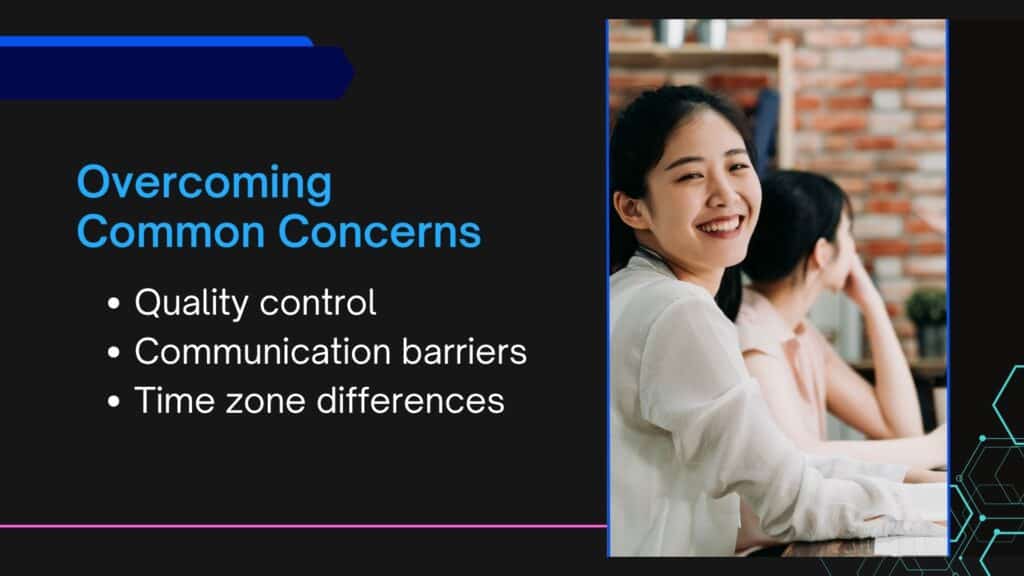Hiring the right people is tough—there’s no sugarcoating it. That’s where Recruitment Process Outsourcing (RPO) comes in, offering a way to hand off the heavy lifting of talent acquisition to experts. But what are the pros and cons of recruitment through outsourcing?
In this blog post, we’re diving into the real questions and concerns people have about RPO. From the game-changing benefits to the potential hiccups, we’ll break it down so you can figure out if it’s the right move for your company. Whether you’re curious or on the fence, let’s unpack the common concerns that small business owners have about RPO, so you can be more confident in your talent acquisition strategy.
What’s So Great About RPO?
Before we get into the downsides and common concerns about RPO, let’s take a moment to talk about the key benefits. Understanding both outsourcing recruitment advantages and disadvantages will make you better understand why RPO is becoming so popular and why so many companies are choosing this recruitment strategy.
Cost savings
One of the biggest perks of RPO is saving money. Outsourcing your recruitment process means you can cut down on costs like job ads, job fairs, and recruiter salaries. Instead, you pay a flat fee or a percentage of the new hire’s salary, which is often much cheaper than traditional hiring methods. This can be a game-changer for businesses, especially those with a lot of hiring to do.
Time efficiency
One of the biggest perks of RPO is how much time it saves. Hiring can be a long, drawn-out process—finding candidates, reviewing resumes, interviewing, and handling job offers all take a lot of effort. With an RPO provider, all of that is handled by recruiting experts who know exactly what they’re doing.
This lets businesses focus on what they do best while the RPO provider handles the hiring. Plus, RPO providers use smart tools and technology to make the process smoother and more efficient, leading to faster hires and better candidates.
Larger talent pool
One great thing about working with an RPO provider is the access to a bigger pool of qualified candidates. They’ve already built connections with job boards, professional networks, and universities, which means they can reach a wider range of talent than most businesses can on their own. This opens the door to a more diverse group of potential hires, making it easier to find the right fit for your team.
RPO providers know how to find great candidates from all kinds of regions and backgrounds. This is especially helpful for companies looking to grow internationally or build a more diverse team. Having access to more candidates means businesses have a better shot at finding the perfect fit for their roles. RPO providers bring advanced screening tools and a bigger pool of resumes to the table, helping you quickly find top-quality candidates with the right skills and experience.
To complete our answer to the question “What are the pros and cons of recruitment through outsourcing?”, we will now dive into the cons and common concerns companies may have about outsourcing their recruitment process.
Overcoming Common Concerns

The idea of hiring people overseas can sound like a great opportunity, offering access to a larger talent pool, potential cost savings, and added flexibility. But let’s be honest, it’s not without its challenges. Many business owners find themselves asking, “What are the pros and cons of recruitment through outsourcing?” It’s a fair question, and you’re not alone in feeling uncertain. Let’s break down the common concerns to help you decide if it’s the right fit for your business.
Quality control
Let’s talk about the real worry when you’re hiring people overseas: are they actually going to do good work? It’s a valid concern. You’re not there to look over their shoulder, so how do you know you’re getting the quality you need? Without some solid checks and balances, you could end up with some seriously inconsistent results.
Here’s how businesses like yours can tackle this, and it really boils down to being proactive:
- Partner with reputable recruitment firms: You want someone who’s already done the legwork, vetted the candidates, and knows who’s got the right skills. Companies like All In Outsourcing, for example, specialise in this. It saves you a ton of time and worry.
- Get clear on what you expect: Set those performance metrics and KPIs. You need measurable goals. Say you want a certain number of tasks completed per week or a specific error rate. Put it in writing, so everyone knows exactly what they’re aiming for.
- Don’t just throw them in the deep end: A solid onboarding and training process is key. Make sure they understand your company culture, how your workflows operate, and what your quality standards are from day one. This investment pays off big time.
It’s about setting things up right from the start. By putting those systems in place, you can get the benefits of offshore recruitment without sacrificing quality.
Communication barriers
You’ve got language differences, maybe some cultural stuff you’re not even aware of, and that can lead to some real gaps in communication. But, honestly, it’s totally fixable. Here’s what can work:
- Think about where you’re hiring: Places like the Philippines, India, and a lot of Eastern European countries, they’ve got tons of people who speak English really well. That makes a huge difference. You’re already starting off on the right foot.
- Use the right tools: Seriously, things like Slack, Zoom, Asana—they’re not just fancy apps. They’re what keep everyone connected. Real-time chat, video calls, project management—it’s all there. It’s like having everyone in the same room, even when they’re miles apart.
- Be super clear: Write everything down. Make sure everyone knows exactly what’s expected. Clear documentation and step-by-step processes—it might seem like overkill, but it saves a ton of headaches later.
When you get these things right, those offshore employees? They just blend right in. It’s like they’ve always been part of the team. Collaboration becomes smooth, and you start wondering how you did things before.
Time zone differences
Everyone gets a little freaked out about time zones when they think about hiring folks overseas, right? How are you supposed to get anything done if you’re working while they’re sleeping? But honestly, if you play your cards right, it can actually be a huge win. Here’s the thing:
- 24/7 coverage: Imagine having customer support or IT running all the time. That’s what you get. Your offshore team can handle stuff overnight, so your customers are always taken care of.
- Faster turnaround: You can send work off at the end of your day, and it’s done by the time you’re back in the office. Boom, projects get finished way faster. For companies in the UK or the US, this is a major plus.
- Overlap is key: You don’t need to be working at opposite times entirely. Just make sure you’ve got a solid 2-4 hour overlap each day. That’s enough time for meetings, quick chats, and making sure everyone’s on the same page.
Don’t see time differences as a problem. See them as a way to keep things moving, get more done, and make your customers happy around the clock. If you’re strategic with scheduling, you can seriously boost productivity and efficiency.
Final Thoughts
So, you’ve got the full picture on Recruitment Process Outsourcing (RPO) now—what are the pros and cons of recruitment through outsourcing? All in all, it’s a game-changer with the potential to save you money, speed up hiring, and connect you with awesome talent from all over.
Sure, there are some challenges like keeping quality tight, navigating communication hiccups, or juggling time zones, but with a solid plan and the right partner, those are totally manageable.
If you’re ready to make hiring less of a headache and build a team that actually works, check out All In Outsourcing and see how they can help you hit your recruitment goals.
Book a free discovery call today and see what’s possible.
